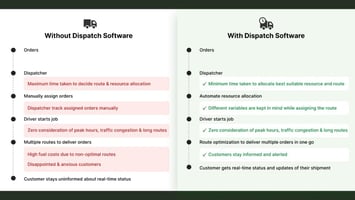The landscape of delivery logistics is undergoing rapid evolution to keep up with the dynamic...
Optimizing Logistics Operations with Dispatch Management Software
In the fast-paced world of logistics, efficiency and optimization greatly affect profitability and customer experience. One of the key components of successful logistics management is effective dispatching. Dispatch software has emerged as an effective tool for businesses, transforming the way logistics operations are handled. In this blog post, we will explore the various benefits and features of dispatch software and how it optimizes logistics management.
1. Understanding & Choosing The Right Dispatch Software
Dispatch software is a specialized tool designed to streamline the dispatching process by automating and optimizing tasks such as job assignment, route planning, scheduling, and real-time communication. It provides a centralized platform that enables dispatchers to efficiently manage and track their fleet, ensuring timely deliveries and effective resource allocation.
The market size for this category is growing steadily at a CAGR of 17.8%. There are 100s of vendors solving a range of challenges across the journey of a shipment. DIspatching is a key step in the process with a lot of variables and constraints and choosing the right tool is critical to the success of your organization. While choosing a tool, it is important to factor the current state of dispatching in your organization carefully take stock of key considerations such as:
- Ease of onboarding & training
- Ability to scale as volumes grow
- Ease of customizations
This will enable seamless adoption of automated dispatching and reaping its benefits faster.
2. Enhancing Efficiency and Productivity
Dispatch software significantly improves efficiency and productivity in logistics management. By automating repetitive tasks, such as manual job assignment and route planning, it frees up valuable time for dispatchers to focus on more strategic activities. The software optimizes routes based on multiple factors like distance, traffic, delivery windows, and vehicle capacity, ensuring the most efficient allocation of resources. Tools can help dispatchers save up to ~30% of their time that is otherwise spent on manual operations.
In addition to dispatchers, it also transforms the lives of drivers by providing them with an intuitive app that gives them direction, clarity and an effective way to do their jobs. This leads to reduced idle time, increased driver productivity, and improved on-time deliveries.
3. Establishing Real-Time Visibility and Communication
Dispatch software offers real-time visibility into fleet operations, allowing dispatchers to monitor the location and status of vehicles and deliveries. This also enables timely intervention, as dispatchers can quickly identify and address any issues that arise during transit. DIspatching tools also enable seamless communication between dispatchers and drivers through integrated messaging systems or mobile applications, ensuring effective coordination and prompt response to changes or delays.
4. Optimizing Route Planning
Route planning is a critical aspect of logistics management, as it directly impacts fuel costs, on-time delivery performance, driver productivity, and customer satisfaction. Dispatch software utilizes advanced algorithms and geospatial data to generate optimized routes, taking into account factors like traffic conditions, delivery priorities, and vehicle capacity. By minimizing mileage and travel time, dispatch software helps businesses reduce fuel expenses and operational costs while improving overall service quality.
5. Improving Customer Service
Efficient logistics management is closely tied to customer satisfaction. According to a recent study, 58% of customers would stop buying from a brand after a single instance of delayed delivery.
Dispatch software plays a vital role in enhancing customer service by providing accurate ETAs, real-time tracking, and proactive notifications. Customers can stay informed about their deliveries, reducing anxiety and uncertainty. Dispatch software also enables dispatchers to handle unexpected situations, such as route changes or delays, promptly and efficiently, minimizing disruptions and ensuring a positive customer experience.
6. Analytics and Performance Monitoring
Dispatch software offers robust analytics and reporting capabilities, allowing businesses to gain valuable insights into their logistics operations. Dispatchers can analyze data on key performance indicators such as delivery times, driver performance, and fuel consumption. These insights enable businesses to identify areas for improvement, optimize processes, and make data-driven decisions to enhance overall logistics performance.
7. Integrating with Other Systems
To further streamline logistics management, dispatch software can integrate with other systems such as order management software, fleet management software, transportation management systems (TMS), or customer relationship management (CRM) platforms. Integration enables seamless data sharing, eliminating the need for manual data entry and ensuring consistency across different systems. This integrated approach optimizes workflows, enhances visibility, and simplifies overall logistics management.
Conclusion
Dispatch software has emerged as a game-changer in the realm of logistics management. By automating tasks, optimizing routes, providing real-time visibility, and improving customer service, dispatch software empowers businesses to optimize their operations and gain a competitive edge. Investing in dispatch software can lead to enhanced efficiency, improved productivity, and greater customer satisfaction. Embrace the secret weapon of dispatch software and unlock the full potential of your logistics management.
To learn more about automating dispatch operations and evaluate automation for your business, please get in touch with us here.



%20(2).jpg?height=200&name=supply-chain-representation-still-life%20(1)%20(2).jpg)